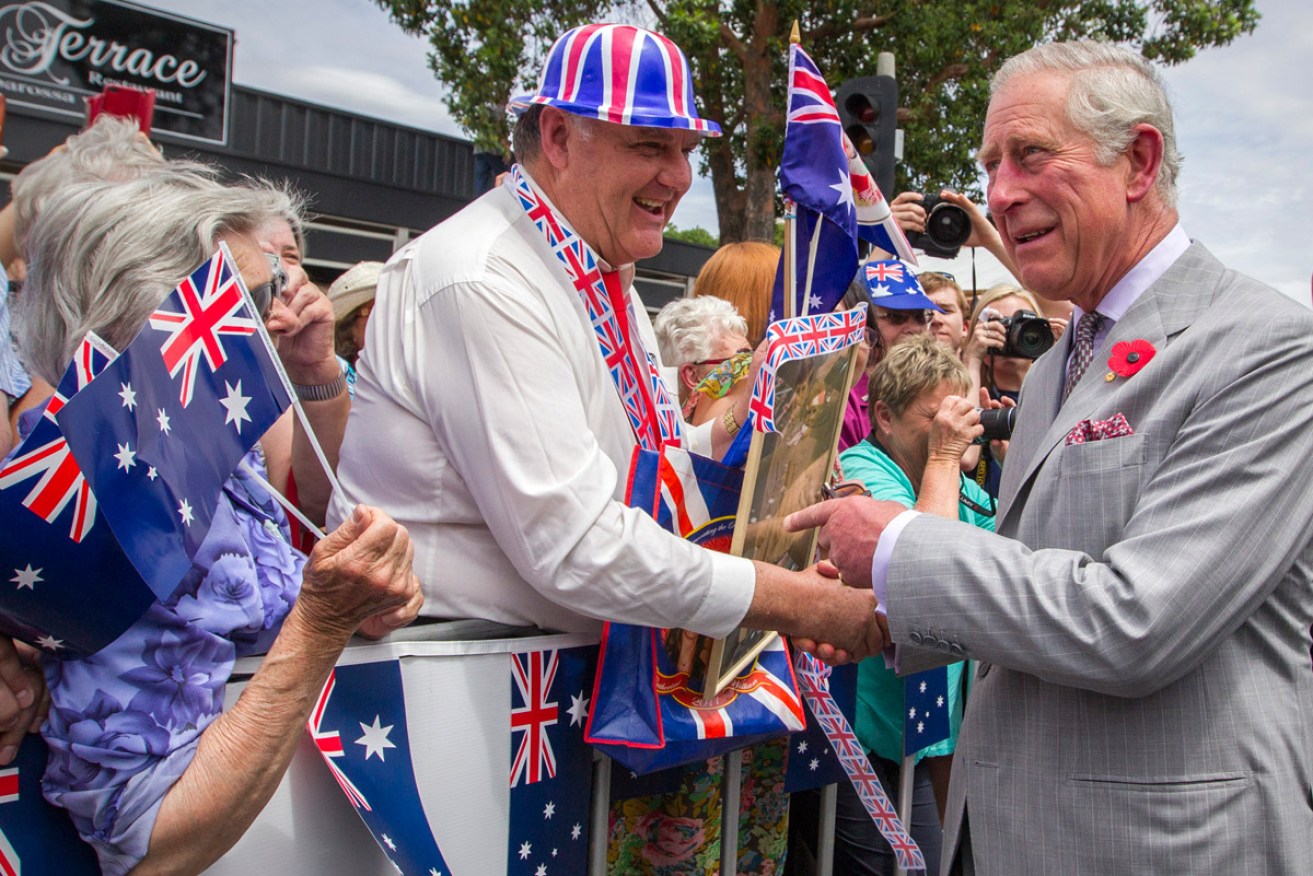Republic debate set to be rekindled
Republicans believe the Queen’s passing will reignite a campaign to achieve Australia’s constitutional independence, but monarchists maintain they have “absolutely no hope”.

Prince Charles in Tanunda.
Republicans yearning to sever mother England’s last apron strings have long acknowledged the personal popularity enjoyed by Elizabeth II and saluted her sterling service.
But they say the time is now right for Australia to strike out on her own – no disrespect intended to the new King Charles III.
Royalists, on the other hand, argue the issue has been off the backburner for so long it is stone cold dead.
Any attempt to resurrect it, they say, will meet the same fate as it suffered in the republic referendum of 1999, when it was not only defeated overall (45-55 per cent in rounded figures) but failed to garner majority support in any state. Only the ACT differed, with 63 per cent in favour.
The republican campaign, led back then by future Liberal prime minister Malcolm Turnbull, was hamstrung by disagreements over which model should be proposed and opposition by John Howard, described by Turnbull as “the prime minister who broke a nation’s heart”.
The Australian Republic Movement’s current leadership believes the Queen’s death changes things.
With the right conditions – including a more acceptable model and backing from The Lodge – Australia could hold another referendum and be a republic within two years, they say.
“A phenomenal number of people have said to me over the years, ‘I’m absolutely with you, but not until the Queen passes away’. And I expect now there will be a surge of interest, of membership, of donations,” chair Peter FitzSimons said.
“With the greatest respect to Charles III – and I mean that; I have nothing against him personally – he does not enjoy the same deep wellspring of affection and loyalty that Her Majesty did.
“What we need is not necessarily a Labor prime minister but certainly a progressive prime minister, somebody that will lead it (the republican push).
“It’s 230-odd years since colonisation and over 120 years since federation. It has to be time we run our own show beneath the Southern Cross,” FitzSimons said.
Australians for Constitutional Monarchy, however, beg to differ. Asked about the odds of an Australian republic following the Queen’s death, national convenor David Flint replied: “Absolutely no hope, I would say. Whatever chance they (republicans) had is gone. I don’t think they will get a second chance.
“If I was a betting man I’d be putting a lot of money on the monarchy.
“Republicans would want much more generous odds than the last Melbourne Cup winner (Verry Elleegant at 15/1).
“They have had their moment to propose a significant change to the governance of Australia that improves things.
“Their model was a bad model; the prime minister could sack a president without notice or grounds of appeal.”
He agreed that Charles was unlikely to be as popular as his mother (a 2018 Ipsos poll showed only 16 per cent of Australians were favourable towards him and 35 per cent unfavourable).
Australian Monarchist League chair Philip Benwell said Charles has spent his life training for the role of king.
“Australians can take comfort in the knowledge that their new king will unequivocally continue the longstanding traditions, dutiful service and vital constitutional role which epitomised our late Queen,” he said.
Prof Flint pointed to a 2021 online Ipsos poll conducted for The Age, The Sydney Morning Herald and Nine News which found 40 per cent of respondents were opposed to a republic, just 34 per cent in favour and 26 per cent undecided, with support lowest in the 18-24 year old group.
“That poll was rolled gold for us,” he said.
“Young people now are less interested in a republic than the Whitlam generation was.
“They are also shy about supporting the existing system so there is a high undecided number.
“But the number definitely in favour was tiny. That’s a time bomb for republicans.
“There’s no emotional support for a republic. It’s a dinner party conversation issue, particularly in places like Wentworth (Turnbull’s old seat).”
Polls generally have shown support for a republic steadily ebbing since a peak in December 1999 – when 57 per cent of Australians were in favour – immediately after the failed referendum.
Some commentators say the republican cause was not helped by former US president Donald Trump, who did little to make a presidential system appealing for many Australians.
FitzSimons said the Ipsos poll was an outlier, pointing to a YouGov poll in 2020 that found 62 per cent of Australians wanted their head of state to be an Australian.
He said his movement’s membership had increased noticeably, in part due to the 2020 release of the “palace letters”, detailing 1975 correspondence between Sir John Kerr and Buckingham Palace, though they suggested that the former governor-general acted alone in sacking Gough Whitlam as prime minister.
“The Queen played no role in the dismissal. Kerr didn’t want to involve her,” said Professor Flint.
FitzSimons described the Queen as an “extraordinary woman”, adding: “On her coronation she pledged her life to the service of the Commonwealth, and she absolutely fulfilled that commitment.”
Charles would not be surprised by any move from Australia to break away, he said.
“I would have much preferred we did it years ago, but let’s do it now.”
Some 34 members of the 54-nation Commonwealth were republics, the newest being Barbados in 2021, and “that could now be us”.
-AAP




